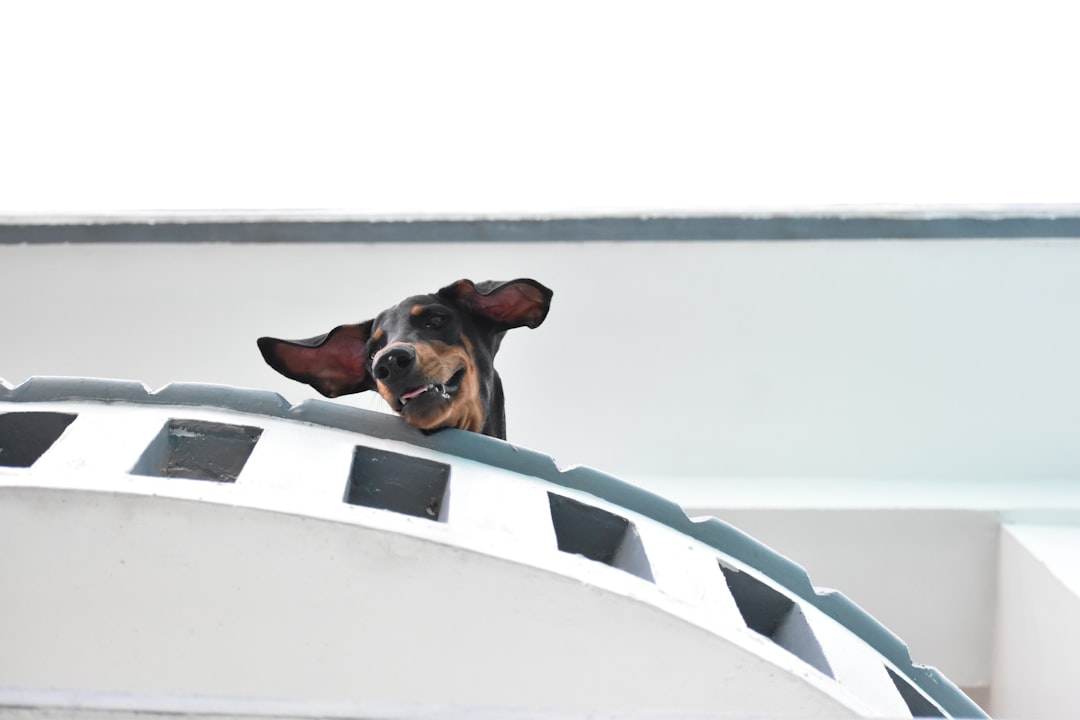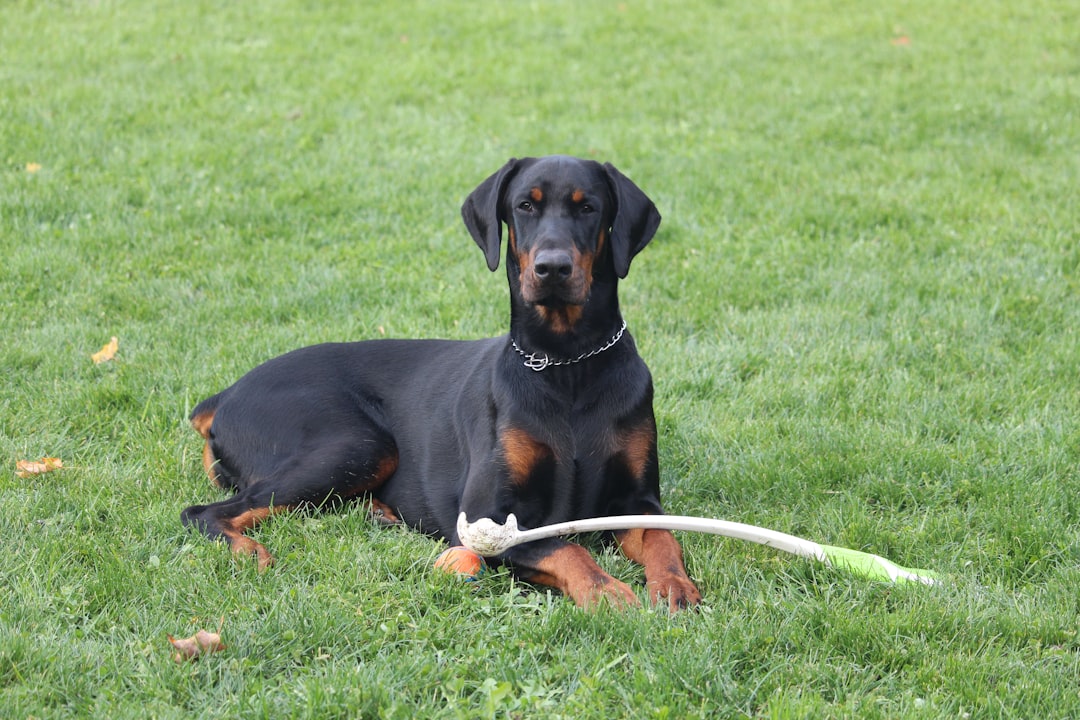Doberman Pinschers: Breed Standards, Characteristics, and Temperament – Learn about the origins of Doberman Pinschers, their physical traits, and their loyal and intelligent temperament as well as their potential uses as protection dogs and the challenges and training needs associated with the breed.

Origin and Characteristics of Doberman Pinschers
The Doberman Pinscher has a rich history that dates back to the late 19th century in Germany. During this time, Karl Friedrich Louis Dobermann, a tax collector, aspired to create a loyal and protective companion to join him during his collections. To achieve this, he selectively bred several dog breeds, including the Rottweiler, Weimaraner, and German Pinscher, resulting in the creation of the Doberman Pinscher. This unique breed was initially intended for guard and police work due to its remarkable strength and agility. Over time, the Doberman Pinscher’s impressive physical attributes, such as its powerful and muscular build, have made it a sought-after breed for various roles.
The breed’s distinct appearance is also a defining characteristic. Doberman Pinschers are usually black or brown with rust-colored markings and possess a short, easy-to-groom coat. Their striking coloration, coupled with their imposing stature, makes them instantly recognizable. The American Kennel Club (AKC) provides comprehensive breed standards for Doberman Pinschers, specifying their size, proportions, and gait. These standards not only serve as a guide for breeders and judges but also highlight the breed’s unique physical traits, further emphasizing its distinctiveness and appeal. Additionally, the Doberman Pinscher is renowned for its fearlessness, vigilance, and intelligence, making it well-suited for various roles, including as a dependable family pet and a versatile working dog. These exceptional qualities contribute to the breed’s reputation as a highly capable and adaptable companion, aligning with its defining traits of loyalty, intelligence, and alertness [2].
Positive Traits and Uses of Doberman Pinschers
Doberman Pinschers are known for their exceptional loyalty, intelligence, and alertness, which contribute to their suitability as guard dogs and devoted family companions [2]. Their unwavering loyalty and quick-witted nature make them ideal for safeguarding homes and properties, while also forming strong bonds with their human families. For example, a Doberman Pinscher’s innate loyalty can be observed when they instinctively protect their owners from potential threats, showcasing their protective instincts and devotion.
In addition to their roles as watchful and protective dogs, Doberman Pinschers are recognized for their remarkable trainability and adaptability, traits that make them highly sought after for protection work and as service dogs. Their ability to respond to training and their innate instincts enable them to excel in various tasks, such as search and rescue, therapy work, and providing assistance to individuals with disabilities. For instance, their alertness and quick learning can be observed in their success as service animals, where they can be trained to respond to specific commands and assist their handlers in various everyday tasks. These positive attributes allow them to contribute meaningfully in enhancing safety, providing support, and promoting companionship.
 Potential Challenges and Training Needs
Potential Challenges and Training Needs
In addition to the positive traits of Doberman Pinschers, such as loyalty and intelligence, it’s important to acknowledge that the breed may exhibit certain challenging characteristics, including aggression and stubbornness. These traits can manifest in various situations, highlighting the need for strong and consistent leadership from the owners. For example, an untrained Doberman Pinscher may display aggression towards strangers, making it crucial for owners to implement proper training and socialization to manage and mitigate such behavior effectively.
Early training and socialization are pivotal in the development of a well-behaved Doberman Pinscher. For instance, exposing the dog to various environments, people, and other animals from a young age can significantly contribute to a well-rounded and balanced temperament. Additionally, consistent training methods that focus on positive reinforcement and clear communication can aid in addressing any signs of stubbornness and fostering obedience in Doberman Pinschers. This proactive approach not only helps in managing potential challenges but also strengthens the bond between the owner and the dog, leading to a mutually respectful and fulfilling relationship.
By recognizing and actively addressing these potential challenges through early training and socialization, owners can create a nurturing and supportive environment for their Doberman Pinschers, allowing them to thrive as well-mannered and well-adjusted companions.
Health, Care, and Lifespan
The health, care, and lifespan of Doberman Pinschers are essential aspects of responsible ownership. With an average lifespan ranging from 10 to 13 years, Doberman Pinschers are susceptible to certain genetic health issues, including hip dysplasia and heart conditions. For example, hip dysplasia, a common orthopedic condition in large dog breeds, can lead to discomfort and mobility issues for Doberman Pinschers, necessitating proactive management and veterinary attention to maintain their quality of life.
In addition to genetic health concerns, maintaining the overall well-being of Doberman Pinschers necessitates a proactive approach to grooming, exercise, and routine veterinary care. Regular grooming, including brushing, dental care, nail trims, and ear checks, is essential for promoting healthy skin and coat, as well as preventing potential health issues. Furthermore, consistent exercise tailored to their medium- to high-energy levels is crucial for their physical and mental stimulation, contributing to their overall fitness and well-being.
Beyond physical care, routine veterinary check-ups and preventive measures, such as vaccinations and parasite control, are vital for safeguarding the health of Doberman Pinschers. This approach not only addresses their specific health needs but also underscores the significance of responsible pet ownership in ensuring that these remarkable dogs thrive throughout their lives.
Doberman Pinschers as Protection Dogs
Doberman Pinschers are highly esteemed for their exceptional qualities that make them excellent protection dogs and guard dogs. Their innate protective nature, intelligence, and unwavering loyalty position them as formidable guardians. For instance, their remarkable alertness enables them to detect potential threats swiftly, while their fearlessness and imposing appearance serve as powerful deterrents, instilling a sense of security within their environment. These traits, when honed through proper training and socialization, empower Doberman Pinschers to effectively fulfill their roles as vigilant and reliable protectors, contributing to the overall safety and protection of their owners and property.
Moreover, the versatility of Doberman Pinschers in protection work is underscored by their adaptability and responsiveness to training. Their keen instincts and ability to learn and execute protective commands make them invaluable in various security and service roles. Whether deployed in law enforcement, search and rescue operations, or as service dogs for individuals with specific needs, Doberman Pinschers demonstrate their capacity to excel in diverse protective capacities, showcasing their significant contribution to enhancing safety and security in various settings. Consequently, their role as protection dogs extends beyond safeguarding physical spaces, encompassing the provision of emotional support and companionship, further highlighting their multifaceted value as protective and loyal companions.
